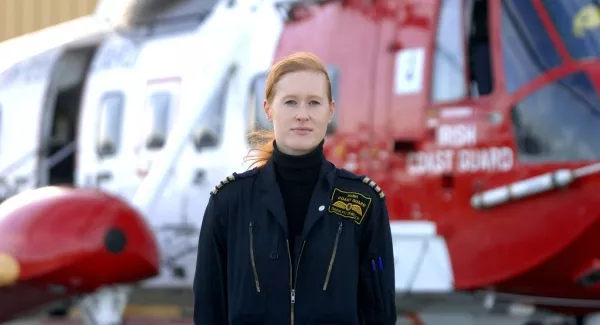The sister of tragic Coast Guard helicopter pilot Dara Fitzpatrick - who died on board an Irish Coast Guard rescue helicopter that crashed in 2017 - has blasted an alleged laser attack on a Coast Guard helicopter crew in Limerick last Thursday night.
Niamh Fitzpatrick, a leading psychologist, described it as “absolutely horrific”.
A source in the Department of Transport, Tourism and Sport (DTTS), said they were aware of the alleged incident.
However, they added the department “does not comment on incidents involving lasers” out of concern it might lead to “copycat incidents”.
Rescue 115, which had earlier left its base at Shannon Airport, was hovering over the River Shannon in Limerick city searching for a female casualty reported in the water when a laser was allegedly pointed towards the aircraft’s cockpit.
When contacted, a DTTS spokesman confirmed the helicopter crew was “stood down” after the callout was deemed to be “a hoax”.
A member of a voluntary search group, who went to the river after hearing the helicopter, later wrote in a Facebook post: “As most of Limerick would have heard, Coast Guard helicopter 115 was over the river tonight as emergency services rushed to search for a reported person seen entering the water, as the search went on, 115 was stood down as certain individuals were shining lasers at 115, endangering the crew.”
“Searching is hard enough, without idiots like this making the task more hazardous. Nothing was found, and search was eventually called off.”
Niamh Fitzpatrick’s sister Captain Dara Fitzgerald, died along with three other crew members on board ‘Rescue 116’ Coast Guard helicopter after it crashed off the coast of Mayo two years ago, in an unrelated rescue mission.
Ms Fitzpatrick said: “It’s absolutely horrific to think of people using lasers in such circumstances. (They need) to engage their brains and grow up. Given that it brings a safety concern for aircraft, would you honestly aim that laser at the helicopter if you knew that it was heading out on a mission to rescue your loved one? Your brother, sister, friend?” she said.
“It’s absurd,” she added.
“Would you continue that behaviour if your own mother or father was a member of the crew on board the helicopter? Or do you simply view it that these crews are random people who you don't know, so it doesn't impact you if there's an accident?.”
“To shine an intense light into a darkened flight deck is hazardous in the extreme. A laser beam can refract through tiny abrasions on the exterior of the cockpit windscreen and thereby illuminate the entire flight deck. Shining a laser light at an aeroplane can have serious consequences on the safety of a flight, making it difficult for pilots to navigate,” she added.

The late Dara Fitzpatrick
Local voluntary and professional emergency services sources have recently criticised people taking photographs and engaging in "rubbernecking" during emergencies on the river.
Ms Fitzpatrick said the rescuers do “such a difficult job, trying to help others”.
She added: “Rubberneckers wondering what's going on and stopping to look, should think about it this way. Again, if it were your loved one that the land-based volunteers and the search and rescue helicopter were seeking to help, wouldn't you want them to be able to work without obstruction or distraction?”
“As members of the public, we can help even if we aren't emergency services personnel or volunteers. We can do so by getting out of the way and letting those who know what to do, to do it. There are other ways to get your kicks.”
In 2014, the State Airports (Shannon Group) Act made it illegal to aim laser pens at aircraft. As of August 26, 2016, there were 31 reports of lasers deliberately pointed at aircraft in Irish airspace.
Since the legislation was introduced, there has been a significant decrease in the number of laser incidents reported by Irish pilots in Irish airspace to Irish Air Traffic Control.
Gardaí have been asked if they are investigating the latest alleged incident in Limerick.
- Additional reporting by Sarah Slater






